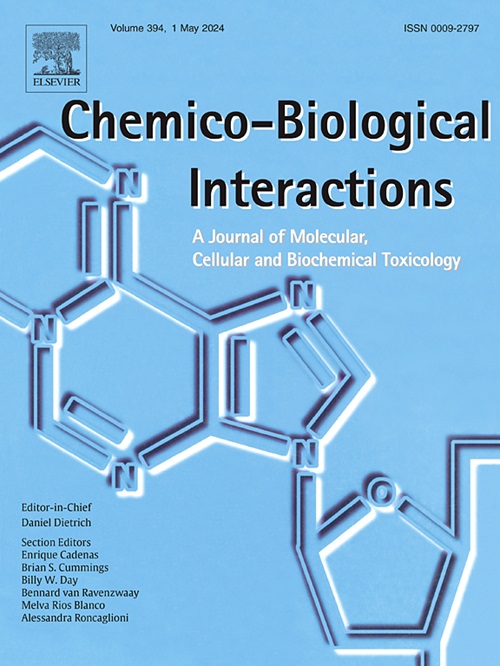抑制JMJD3通过抑制LPS/ d - gal诱导小鼠的炎症和氧化应激来减轻急性肝损伤
IF 4.7
2区 医学
Q1 BIOCHEMISTRY & MOLECULAR BIOLOGY
引用次数: 0
摘要
组蛋白甲基化/去甲基化是控制遗传基因表达和染色质结构的关键表观遗传机制,对肝脏疾病的发病机制具有深远的影响。JMJD3 (KDM6B)是一种含有Jumonji结构域的组蛋白去甲基化酶,特异性靶向组蛋白H3 (H3K27me2/3)上的二甲基化和三甲基化赖氨酸27,已成为炎症性疾病的关键调节因子。本研究主要探讨JMJD3对急性肝损伤的影响及其机制。利用体外(LPS刺激的RAW264.7巨噬细胞)和体内(LPS/d-半乳糖胺诱导的小鼠模型)系统,我们证明了急性肝损伤期间JMJD3的表达显著上调。引人注目的是,选择性JMJD3抑制剂GSK-J1或sirna介导的JMJD3沉默的药理学抑制强有力地减弱了巨噬细胞中促炎细胞因子的产生,并显著改善了小鼠的肝脏炎症和组织损伤。从机制上讲,JMJD3抑制提高了全球H3K27me3水平,抑制了NF-κB信号激活和下游炎症级联反应。此外,JMJD3抑制激活了Nrf2/HO-1抗氧化途径,通过上调关键抗氧化酶增强细胞对氧化应激的防御。这些发现表明,JMJD3在肝损伤中协调了促炎症和促氧化的双重途径,使其成为一种新的治疗靶点。我们的工作不仅促进了对肝病理表观遗传调控的分子理解,而且还确定了GSK-J1作为减轻急性肝损伤的有前途的药理学候选药物。本文章由计算机程序翻译,如有差异,请以英文原文为准。
Inhibition of JMJD3 attenuates acute liver injury by suppressing inflammation and oxidative stress in LPS/D-Gal-induced mice
Histone methylation/demethylation represents a pivotal epigenetic mechanism governing heritable gene expression and chromatin architecture, with profound implications for the pathogenesis of hepatic disorders. JMJD3 (KDM6B), a Jumonji domain-containing histone demethylase specifically targeting di- and trimethylated lysine 27 on histone H3 (H3K27me2/3), has emerged as a critical regulator of inflammatory diseases. The study primarily investigates the impact and mechanisms of JMJD3 on acute liver injury. Utilizing both in vitro (LPS-stimulated RAW264.7 macrophages) and in vivo (LPS/d-Galactosamine-induced murine model) systems, we demonstrate that JMJD3 expression is dramatically upregulated during acute liver injury. Strikingly, pharmacological inhibition with the selective JMJD3 inhibitor GSK-J1 or siRNA-mediated JMJD3 silencing robustly attenuated pro-inflammatory cytokine production in macrophages and substantially ameliorated hepatic inflammation and tissue damage in mice. Mechanistically, JMJD3 inhibition elevated global H3K27me3 levels, suppressed NF-κB signaling activation and downstream inflammatory cascades. Furthermore, JMJD3 inhibition activated the Nrf2/HO-1 antioxidant pathway, enhancing cellular defenses against oxidative stress by upregulating key antioxidant enzymes. These findings suggest that JMJD3 orchestrates dual pro-inflammatory and pro-oxidative pathways in liver injury, positioning it as a novel therapeutic target. Our work not only advances the molecular understanding of epigenetic regulation in hepatopathology but also identifies GSK-J1 as a promising pharmacological candidate for mitigating acute hepatic damage.
求助全文
通过发布文献求助,成功后即可免费获取论文全文。
去求助
来源期刊
CiteScore
7.70
自引率
3.90%
发文量
410
审稿时长
36 days
期刊介绍:
Chemico-Biological Interactions publishes research reports and review articles that examine the molecular, cellular, and/or biochemical basis of toxicologically relevant outcomes. Special emphasis is placed on toxicological mechanisms associated with interactions between chemicals and biological systems. Outcomes may include all traditional endpoints caused by synthetic or naturally occurring chemicals, both in vivo and in vitro. Endpoints of interest include, but are not limited to carcinogenesis, mutagenesis, respiratory toxicology, neurotoxicology, reproductive and developmental toxicology, and immunotoxicology.

 求助内容:
求助内容: 应助结果提醒方式:
应助结果提醒方式:


